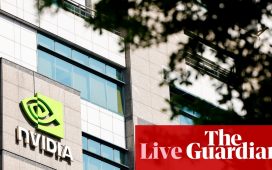Flights at Luton airport suspended until 3pm
All flights at Luton airport are suspended until 3pm, the airport said in a statement.
It is Britain’s fifth-busiest airport after Heathrow, Gatwick, Stansted and Mancheter, and it handled 13.3 million passengers last year, according to the Civil Aviation Authority.
Sky news correspondent Matthew Thompson tweeted:
The aftermath of the Luton Airport fire. You can see where the car park has completely collapsed inside.
Early indications are that it was a car fire that spread. As many as 1,200 vehicles were in the car park at the time. pic.twitter.com/3MJcHbTwXj
— Matthew Thompson (@mattuthompson) October 11, 2023
Key events
Travis Perkins warns on profit on UK housing market woes
Travis Perkins, Britain’s biggest supplier of building materials, has downgraded its annual profit forecast by as much as 27%, as it blamed tough conditions in the new-build housing and home renovation markets. Its share price fell 10% on the news.
The company said it experienced a “notable deterioration in market activity and sentiment” in September.
Nick Roberts, the chief executive, said:
Market conditions remain challenging with continued weakness across new build housing and domestic repair, maintenance and improvements.
However, Travis Perkins, which owns Toolstation, remains confident in the long-term outlook, saying Britain needs more homes while older houses and buildings will need to be revamped to make them net zero.

Susannah Streeter, head of money and markets at Hargreaves Lansdown, said:
There are concerns creeping back in about higher energy prices, causing fresh inflationary pressures by pushing up fuel bills and potentially causing havoc with central bank forecasts. UK and European gas prices shot up over supply concerns, edging down only a little and still hovering around six-month highs. The jitters came after Chevron was told to shut down production at the Tamar natural gas field in Northern Israel due to the violence.
There are also worries about potentially deliberate damage to the Baltic connector gas pipeline between Finland and Estonia. Oil prices are settling, but a barrel of the benchmark Brent Crude is trading at just under $88 dollars a barrel, up sharply from the price before the attacks in Israel. Although initial supplies aren’t affected, there are still worries about potential knock-on effects if there is contagion across the wider Middle East region.
The UK’s second-biggest drugmaker GSK is one of the biggest risers on the FTSE 100 index, with the shares up 1.3%. It announced that it had reached a confidential agreement on a lawsuit in California which alleged that its discontinued heartburn drug Zantac caused cancer.
Analysts at JP Morgan said:
We believe any rally may be short-lived, given today’s outcome doesn’t allow us to lower our total Zantac liability – we have a 50% of a $5bn liability – and given GSK’s decision to again settle, suggest the company is likely to have to pay out on many of the outstanding cases.
Stocks down, oil prices up, gas prices retreat
In financial markets, the FTSE 100 index in London is broadly unchanged at 7,632, up just 4 points.
The other main European bourses are in the red, with Germany’s Dax down 0.3%, France’s CAC losing 0.8% and Italy’s FTSE MiB flat.
Oil prices are pushing higher on concerns that the war between Israel and Hamas and rising tensions in the region could affect the output of major producers. Brent crude hit $89 a barrel on Monday and is trading 0.6% higher at $88.17 a barrel at the moment. US crude is up 0.6% at $86.46 a barrel.
Gas prices have also retreated after yesterday’s spike, when UK gas jumped 15% and European gas soared 16% after the gas pipeline “Baltic Connector” between Finland and Estonia started leaking.
Extensive damage to an undersea gas pipeline and communications cable connecting Finland and Estonia “could not have occurred by accident” and appears to be the result of a “deliberate … external act”, Finnish authorities have said.
UK natural gas for October fell 6.5%, while Dutch natural gas futures for November is down 5.5% this morning.
Flights at Luton airport suspended until 3pm
All flights at Luton airport are suspended until 3pm, the airport said in a statement.
It is Britain’s fifth-busiest airport after Heathrow, Gatwick, Stansted and Mancheter, and it handled 13.3 million passengers last year, according to the Civil Aviation Authority.
Sky news correspondent Matthew Thompson tweeted:
The aftermath of the Luton Airport fire. You can see where the car park has completely collapsed inside.
Early indications are that it was a car fire that spread. As many as 1,200 vehicles were in the car park at the time. pic.twitter.com/3MJcHbTwXj
— Matthew Thompson (@mattuthompson) October 11, 2023
LVMH reports slowing growth
The French luxury goods giant LVMH (Moët Hennessy-Louis Vuitton) has reported slower growth, as it has taken a hit from rising inflation and growing global financial instability.
The company, whose brands include Christian Dior, Louis Vuitton and Stella McCartney fashion, alongside TAG Heuer watches and Bulgari and Tiffany jewellery, reported revenue of €20bn (£17.25bn) between July and September – a 9% rise. That compares with a 17% increase in the previous quarter.
Pauline Brown, the former chair of North America at the luxury group, said a number of factors are at play.
The issue we’ve had with inflation is not just that it is here, but that it came on quite suddenly, or quite quickly. And we, as a society, we got used to a few decades of, really, really low inflation. So it’s still hitting us as a bit of a shock.
But geopolitical developments, namely the war between Israel and Hamas, have become a bigger concern, she said.
If I were sitting on the board at LVMH, or any of the other luxury companies would really be rattling me is that geopolitical destabilisation around the world. And let’s just take what happened this last week in Israel. Why is that important here? Number one, because luxury goods and services is a psychological purchase. Nobody needs a glass of champagne. Nobody needs a watch or a diamond necklace. And in order for you to buy for yourself or as a gift, you really have to be in the right mood state. And when we see atrocities happening as we are right now, the appetite to spend on what might be perceived or experienced as frivolous, goes way down
And then on a more pragmatic level, you know, there was still very strong growth in Middle Eastern buyers, whether they were buying it locally, in Dubai and elsewhere in the region, or they were travelling and and the concerns that started in the Middle East are now spreading and changing the social dynamic, even within the Middle Eastern regimes. That’s going to lead to a slowdown in in how people spend and where they spend. And that is not the only corner of the world right now.
One of the worst hit divisions at LVMH is wines and spirits, which posted a 14% decline in sales over the quarter, as sales of cognac declined.
Unlike say champagne, cognac is really an aspirational consumers drink. Most collectors who might buy from Napa Valley or from Bordeaux, are less prone to be collecting cognac. That was hit hard in markets like China and North America. Because that aspirational consumer is just not spending with the same enthusiasm that the high net worth is, and the high net worth are continuing to spend even with some of the macro conditions that we’re all noting.

Kyle Rodda, senior market analyst at Capital.com, has looked at the Birkenstock IPO.
Will the hipsters buy the stock of Birkenstock? If they don’t, the investment community certainly seems to want “in’’ on the brand loved by so many boujie 30-something-year-olds. The company is looking poised for a fully subscribed IPO – the fourth on Wall Street in the space of roughly a month.
It puts the company’s valuation around the top end of the $44 – $49 target range, or $10bn. Arguably, that’s pretty rich. Based on the company’s latest revenue release, the stock’s price-to-sales ratio is above 6, which is at the higher end of comparable consumer discretionary companies on Wall Street. In a higher interest rate environment, these multiples may be hard to sustain in the short term, especially if consumer spending slows as expected next year as interest rate hikes bite households.
Recent companies to IPO have seen their stocks surge on the day of listing, although the moves have proven short-lived. The Birkenstock IPO will be a good measure of broader market sentiment and sentiment toward consumer-sensitive stocks. It might tell us, too, whether cashed-up millennials like to buy the stocks of products they commonly find on the bottom shelf of their wardrobes.
Flights at Luton airport suspended until mid-afternoon after fire, Birkenstock to float in New York
Good morning, and welcome to our rolling coverage of business, the financial markets and the world economy.
Luton airport closed last night after a large fire, and all flights were suspended. Flights are not expected to resume until mid-afternoon at the earliest.
The fire ripped through a multi-storey car park, causing it to collapse. We’ll keep you posted.
Today Birkenstock, the orthopaedic 250-year-old German shoe brand, is to float on the New York stock market. The sandal maker, once seen as frumpy but now the go-to footwear of hippies willing to sacrifice style for arch support, priced its shares at $46 ahead of its first day of trading, giving the company a market valuation of $8.6bn (£7bn). The shares start trading later today.
Rural homeowners living near new electricity pylons and cables that are being rolled out as part of the UK’s shift to net zero could be offered home insulation, heat pumps and other energy efficiency measures by National Grid, the Daily Telegraph reported.
Ben Wilson, National Grid’s chief strategy officer, said the company wanted people living alongside pylons and cabling to benefit from the infrastructure. He told the paper:
I do think if you’re hosting the infrastructure, you should get a benefit in terms of your cost of energy, maybe help with energy insulation or helping to electrify your home in terms of heat.
He suggested National Grid could also establish training academies to boost employment in the areas most affected by new transmission lines.
Inflation in Germany has eased to an annual rate of 4.3%, the latest official figures show. Ruth Brand, president of the Federal Statistical Office, said:
The rate of inflation has dropped to the lowest level since the start of the war in Ukraine. It remains high, however. Consumers are still clearly feeling the higher food prices.
Also coming up
The annual meetings held by the International Monetary Fund and the World Bank in Marrakech, Morocco, are under way. Yesterday, the fund warned that the Bank of England will need to keep interest rates high into 2024 as the UK struggles with a combination of weaker growth and persistent inflation.
In its half-yearly update on the global economy, the IMF said growth had already slowed “fairly sharply” and painted a downbeat picture for the government as it enters what will almost certainly be an election year.
The Agenda
-
IMF/World Bank annual meetings in Marrakech
-
1.30pm BST: US producer price index for September
-
7pm BST: US Federal Reserve minutes of last meeting










